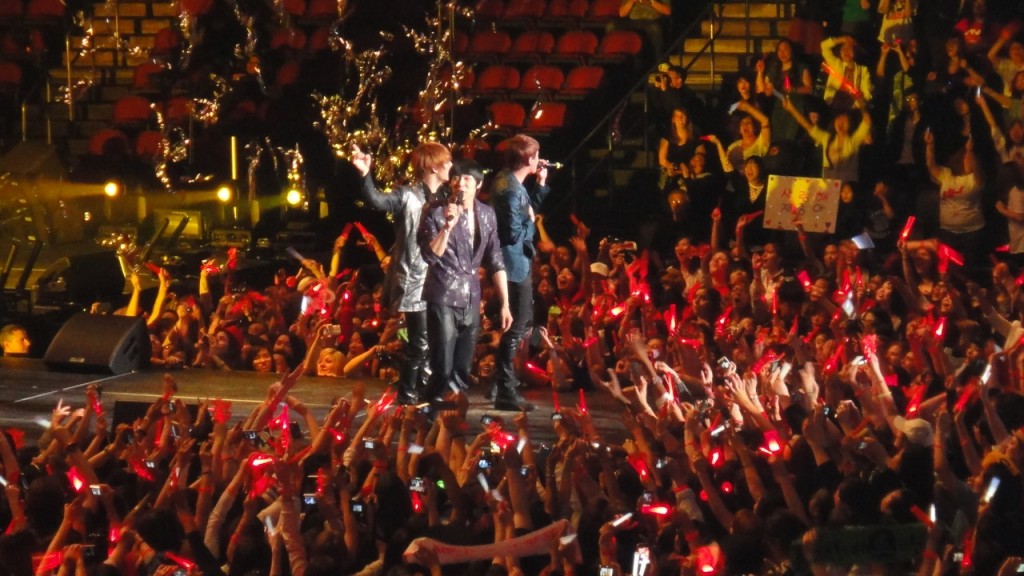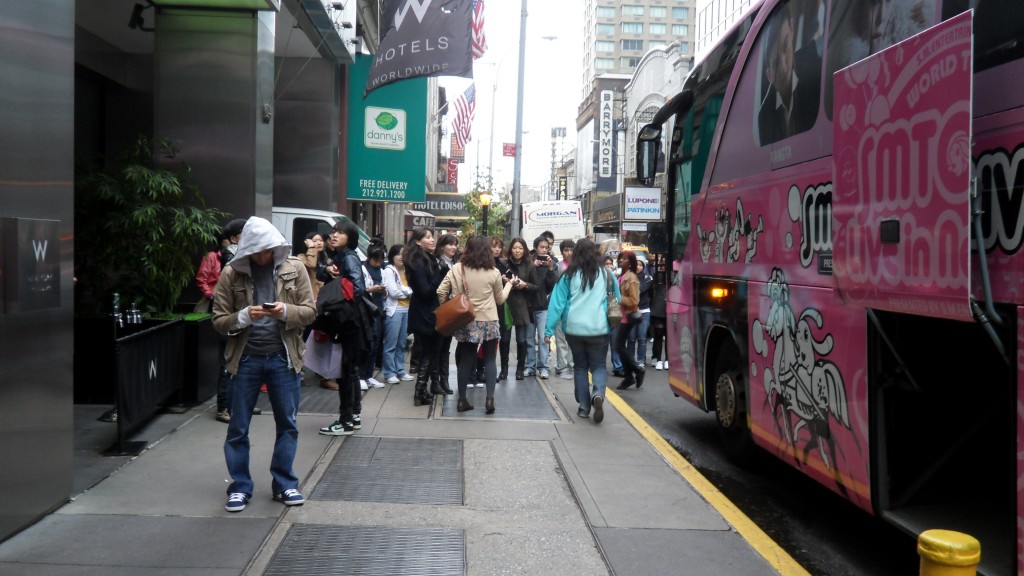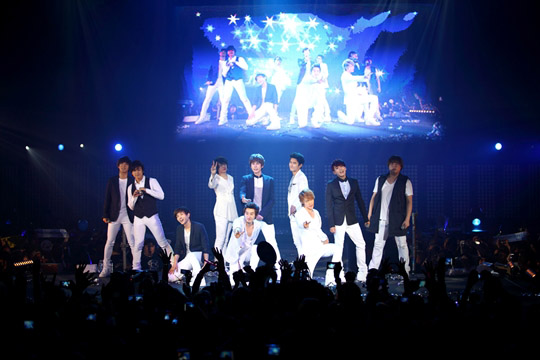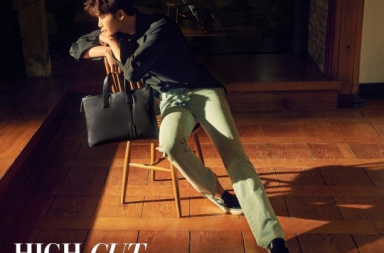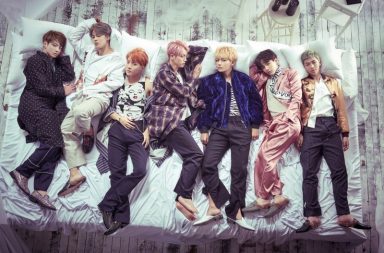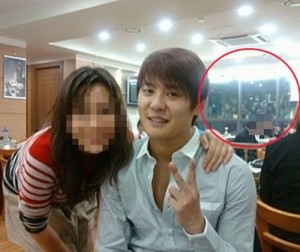 Frankly, at this point I don’t really care if people look at the title of this article and subsequently choose to immediately disregard everything I’m about to write. Quite some time has passed since audio evidence of JYJ’s Jaejoong allegedly beating a sasaeng fan was released, and many fans seem eager to brush the issue under the carpet and never look at it again.
Frankly, at this point I don’t really care if people look at the title of this article and subsequently choose to immediately disregard everything I’m about to write. Quite some time has passed since audio evidence of JYJ’s Jaejoong allegedly beating a sasaeng fan was released, and many fans seem eager to brush the issue under the carpet and never look at it again.
Since then, JYJ has issued an official apology in regards to the matter. Additionally, the sasaeng fan herself has spoken up about the issue, claiming that Jaejoong “barely touched [her]” and offering little more than a simple narrative as to what had happened. Nonetheless, this was enough for fans and non-fans alike to brush aside the allegation of Jaejoong being physically violent with a fan, and instead choose to cast the blame entirely on sasaeng fans instead. With the widespread internet circulation of various documents listing various terrible things that sasaeng fans have done to K-pop idols, the vilification of sasaeng fandom has been significant. Understandably, many were angry about the “sub-human” behavior of these sasaeng fans–to the point where the anger over sasaeng fandom seemed to mute the significance of the actual issue of Jaejoong hitting a fan.
Speaking out against sasaeng fans is justified, yes. There’s no denying that sasaeng fans do some pretty horrible and horribly illogical things at the expense of others. But by solely lashing out against sasaeng fans and failing to acknowledge the other factors in this issue, we oversimplify the problem and fail to acknowledge the complexities therein. Many fans have said that the issue is over and done with. But with the way things have been handled, I’m not willing to take that for an answer. There are way too many questions that remain unanswered–not because there are no answers to be found, but because everyone’s chosen to ignore them.
For one, are we really going to say “it’s over” just because a sasaeng fan spoke up and said that Jaejoong “barely touched” her? Are we now going to readily believe anything a sasaeng fan says, despite the fact that fans have collectively vilified sasaeng fandom as being “immoral?” Have we not considered that this sasaeng fan might be trying to “protect” Jaejoong by rounding the corners of her story, just as many other sasaeng fans have chosen to withhold incriminating evidence against various K-pop idols for the sake of “protecting” them? Or are we accepting this sasaeng fan’s “statement” as a definitive end-all be-all to the situation just so we can push everything under the carpet for good?
It seems that many fans don’t really know what to do with themselves whenever a scandal comes up–that is, until they find one single target to collectively blame. Once everyone’s had their fun expressing their rage at that one target, the fandom moves on and the issue is quickly forgotten. But this issue of Jaejoong hitting a fan is being vastly oversimplified, and fans are overlooking crucial details for the sake of maintaining a happy fandom. But that’s not called peace. That’s called ignorance, and it’s high time that this ignorance was broken.
Let’s assume that the audio recording of Jaejoong hitting a fan was authentic (and if you’re one of those people who actually believes that the recording was fake, edited, or worse, “ripped” from that Banjun Drama that DBSK did in 2005 [which bears absolutely no resemblance to the sasaeng fan recording], then I have nothing more to say to you). Prior to all this hullabaloo with the sasaeng fans, the main questions of contention were:
1) Were Jaejoong’s actions a measure of self-defense, and if so,
2) Were they justified?
The answer to question 1 relies on the context of the situation, of which there is not sufficient physical evidence to support. But even assuming that Jaejoong was acting in self defense, was he right in hitting a fan? In the end, this boils down to a question of basic morality. Some people believe in an eye for an eye; others believe that retribution is never appropriate, particularly physical retribution. In that end, the debate on whether or not Jaejoong was right in hitting the sasaeng fan will never end, simply because people have different core values.
Nevertheless, it seems as if people have been completely derailing from the issue and choosing to place all the blame on sasaeng fans, when in fact the problem is much more complex and many more parties are at fault. Namely, three.
No matter how one looks at it, Jaejoong (and assumedly Yoochun, if the earlier video evidence of him hitting a fan is indeed credible) was unprofessional in his actions. The word “unprofessional” seems to be overly euphemistic when referring to a man who physically assaulted one of his fans, but in the context of Jaejoong’s career as a public figure, it is fitting.
As an American, the idea of celebrities being “unprofessional” makes me chuckle, because many American celebrities live out their celebrity lives not really giving a shiz about whether or not they’re being “professional.” Never mind the fact that American celebrity culture is shrouded in high-profile alcohol and drug use; American celebs lash out at paparazzi and crazy fans all the time with little to no regard as to what detrimental effects their actions might have on their public image. As a result, celebrities are not held in high regard within American society, but have instead become laughingstocks for the American public to belittle and poke fun at. And in America, that’s okay; our culture has become accustomed to this sort of dynamic.
But this kind of outlook doesn’t fly in Korean culture, where public figures are supposed to be role models and are supposed to “contribute to the greater good of the country.” Some might criticize this and say that Korean society is at fault for ‘deifying’ celebrities to a superhuman ideal. But think about how Korean society and youth culture has been cultivated these past few years. Popular culture and media is so pervasive throughout Korean society, and much of this media is saturated with the image and thus, influence, of Korean idol stars. There are so many Korean kids who aren’t just fans of these stars, but seriously look up to them and aim to follow in their footsteps. Being caught hitting someone else, whether provoked or otherwise, just looks bad. It doesn’t matter how much fans try to rationalize Jaejoong’s behavior, as he will always be known as that celebrity who once beat a fan. No Korean mother will ever want their child following in the footsteps of a public figure with a tarnished image. Not only does unprofessional behavior set a bad example, but it becomes heartbreaking for those who have set such high expectations for people they have been conditioned to admire and trust.
Also, say what you want about whether or not retaliation against hostile behavior is appropriate, but the issue of a man hitting a woman is not as simple as saying, “Well, men have as much a right to defend themselves as women do, and saying otherwise is sexist.” This argument is a fallacy in itself. I don’t trust that Jaejoong and Yoochun get into fisticuffs with people on a regular basis, but that’s exactly where the problem is. Men use violence on “obstinate” women because they feel that, as men, the only remaining upper hand they have against women is their physical strength. One cannot deny that men are physically stronger than women. Men know that, and they know that the only definite way in which women can’t defeat them is if they use physical violence. And that’s what Jaejoong and Yoochun did. We say that they “snapped” and “lashed out,” but this only reinforces the fact that they had no other way than to resort to the one method where they know (or they think they know) that they will win against a woman. That is patriarchal, and that is wrong.
 2. Sasaeng fans (and fans in general)
2. Sasaeng fans (and fans in general)
I don’t think I need to go in detail about the atrocities of sasaeng fans, as the K-pop community seems to have done more than enough to highlight exactly how evil sasaeng fans are. Yes, they suck, and they’re evil, and they do crazy stuff, and their actions are inexcusable. But is their behavior that far off from the behavior of so-called “regular fans?” Not really.
Sasaeng fan behavior originated in Korea, primarily because, well, sasaeng fans can only stalk their idols at such a high level of intensity when they’re in close physical proximity of their idols, and it certainly doesn’t help that almost all K-pop idols live, work, and play in the most populated city in the country. Needless to say, you can’t stalk your idol if you aren’t in the same country as them. But with the trend of K-pop stars promoting overseas, we’re now seeing more and more sasaeng fan behavior in Japan, China and Taiwan. And it doesn’t get any better there, either.
We all think that sounds really bad and inhumane, but let’s think about what happens when idols go to Europe or the United States, where large amounts of fans regularly camp outside their hotels, as in the case of SMTown NYC last fall, or where fans stalk celebrities’ Twitters for a chance to “run into” them when they know that they’re on vacation in their country, as in the case of Super Junior in Europe a few months ago. Is this behavior not an invasion of privacy all the same? Yet international fans, who consider themselves so much more “sane” than sasaeng fans in Asia, do it anyway because it’s a “once in a lifetime opportunity.” And they do it in the masses, oftentimes choosing to stalk the artists as a way to pregame a K-pop concert.
In the days preceding SMTown NYC, fans in New York complained like hell when the SM artists left from a back exit at JFK for security reasons. This is JFK Airport in New York City, where the September 11th attacks took place ten years earlier, and where an uncontrolled crowd of hundreds of hysterical people could be perceived as a threat to security. Many were understanding of the situation, but the number of “but we waited for so loooong” complaints I heard made me want to break someone’s skull. Since when did we get so entitled?
Or imagine if any one K-pop artist decided to stay and promote in any city in America or Europe for an extended period of time. Fans would stalk the artist even harder than usual. Would this then be seen as normal behavior, just because everyone else is doing it?
This behavior doesn’t come out of nowhere. It progresses, building on behavior that might otherwise seem “normal.” There are two key factors to this behavior: physical proximity and competition. The former has been explained above. The latter, however, is manifested in the idea that if one fan is wiling to do x to get close to an idol, another fan will be willing to do x+1, and the next fan will be willing to do x+2, and so on. Every fan has the same goal of being the “closest” person to the idol in question, since there’s only so much breathing room around each idol. This competition gets more and more fierce once you have more and more people pursuing the same interest. In America and Europe, it’s not that bad. Not yet, anyway. But in Asia, where K-pop reigns as king over the hearts of almost every teenage girl between the ages of 13 and 17? It’s hell.
That’s why sasaeng fans seem so horrible in Korea, but it could be equally as bad anywhere else. International fans often engage in behavior that resembles sasaeng behavior on the pretense that it’s a “once in a lifetime opportunity.” This “once in a lifetime opportunity” mindset, however, can soon morph into something unrecognizable and dangerous. Sasaeng fans themselves say that the reason they do it is because they “can’t get enough.” That’s why we need to check ourselves and our own behavior before casting blame. One cannot take pleasure in stalking idols at the airport or at their hotel, only to then turn around and vilify sasaeng fan behavior because, in reality, the two are very much related.
And besides, has anyone every asked how the idols themselves want to be treated? Not by their management companies, but by their fans? How do we know that idols don’t appreciate being “greeted” by fans at the airport, or getting macro’ed and reblogged all over Tumblr, or being innundated with expensive fan gifts that they neither want nor need? If you think about it, fandom is a pretty selfish activity, and the fact that “normal fandom” can so easily degenerate into something as horrifying as sasaeng fandom is something to be fearful of.
So what exactly drives fans to want to meet and stalk their idol in the first place? What forms the divide between singer and celebrity? Arguably, there’s always something mystifying about seeing someone in person that you’ve previously only ever seen on your television screen, be it an A-list celeb or your local news anchor. But what is it about K-pop idols that drives fans to follow them, obsess over them, fall in love with them and never turn back? Or rather, what is the nature of the relationship between K-pop idols and K-pop fan that has the potential to produce something as perverse as a sasaeng fan?
Idols in the mainstream K-pop vein seem to be spending more and more time marketing their personalities and “likability” to an audience that primarily bases their decision to invest in an artist on their affinity towards the characters they see on screen. This audience consists of self-professed fans who spend money going to concerts, join fanclubs, buy albums for the sake of “helping” the artist win awards, or otherwise form some sort of emotional connection with the idol in question. They are not just casual listeners. As a result, fans feel a certain closeness with the idol – they are the ones buying and listening to their albums, waving the glowsticks at concerts, and doing the fanchants. This emotional connection results in behavior that makes it seem as if the fan has an actual close, personal relationship with the idol, when in fact there is none. It’s not that fans feel entitled to cozy up to their idol after filling their paycheck; it’s because fans have a distorted idea of how healthy fandom actually should work. But these fans are also the ones generating the most revenue for the entertainment companies, so the idols are marketed towards them. This can be seen by how idols are portrayed in television and in music videos. Thus, the relationship between fan and idol is very narrow and very skewed.
The best thing that could ever happen to the K-pop industry is if Korean entertainment companies stopped relying on hardcore fans as their primary buying audience and started marketing towards the public at large. By definition, pop music is supposed to have mass appeal. But the nature of K-pop is the direct opposite, in that the most profitable audience for K-pop is relatively small. But because of this, entertainment companies feel the need to create products that cater to this audience–fanservice-y music videos, emotionally exploitive variety show appearances, songs that constantly talk about a “special girl/boy.” The entertainment companies create media that no one apart from emotionally and hormonally dependent fans will consume and be hungry for more. This not only creates an unhealthy fandom that feeds the growth of sasaeng fans, but also makes for little variety in creative material. Why else do you think SM has gotten away with making dancing-in-a-box, close-up-shot-every-three-frames music videos for so long?
So how do we fix this? It kind of horrifies me that K-pop fandom is so quick to cast all of the blame on sasaeng fans and paint them as the world’s greatest evil when, in fact, these same fans indulge in activities that are not that far off from sasaeng fandom. Sasaeng fandom is selfish, but so is so-called “normal fandom,” and to be in denial of the potential damage of normal fandom is dangerous.
Before this whole JYJGate scandal happened, I remember thinking that sasaeng fandom was something that K-pop fans knew about but never took seriously simply because it was so bizarre, so ridiculous and so out of the realm of our own understanding. Now, we are given more than enough reason to take sasaeng fandom seriously. But with that, I think it’s also appropriate for K-pop fandom as a whole to look at our own behavior and see how we contribute to the cycle. It’s clear that fans wish to disregard the news of Jaejoong hitting a fan simply because they don’t wish for Jaejoong’s name to be tarnished. And as much as I’d be willing to argue that Jaejoong ought to be held responsible for his actions, I think I’d be a lot more at peace if the reason why fans want to ignore this issue is if they came to the realization that sasaeng fan behavior is not all that dissimilar from their own behavior and are in denial over it. But sadly, this issue was bolted shut at the hands of fans who oversimplified the problem and pinned all the blame on one relatively faceless entity, when in doing so, they were indirectly pinning the blame on themselves as well.
